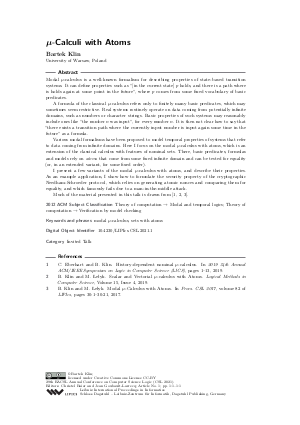μ-Calculi with Atoms (Invited Talk)
Author Bartek Klin
-
Part of:
Volume:
29th EACSL Annual Conference on Computer Science Logic (CSL 2021)
Part of: Series: Leibniz International Proceedings in Informatics (LIPIcs)
Part of: Conference: Computer Science Logic (CSL) - License:
 Creative Commons Attribution 3.0 Unported license
Creative Commons Attribution 3.0 Unported license
- Publication Date: 2021-01-13
File

PDF
LIPIcs.CSL.2021.1.pdf
- Filesize: 184 kB
- 1 pages
Document Identifiers
Subject Classification
ACM Subject Classification
- Theory of computation → Modal and temporal logics
- Theory of computation → Verification by model checking
Keywords
- modal μ-calculus
- sets with atoms
Metrics
- Access Statistics
-
Total Accesses (updated on a weekly basis)
0Document
0Metadata
Abstract
Modal μ-calculus is a well-known formalism for describing properties of state-based transition systems. It can define properties such as "[in the current state] p holds, and there is a path where is holds again at some point in the future", where p comes from some fixed vocabulary of basic predicates. A formula of the classical μ-calculus refers only to finitely many basic predicates, which may sometimes seem restrictive. Real systems routinely operate on data coming from potentially infinite domains, such as numbers or character strings. Basic properties of such systems may reasonably include ones like "the number n was input", for every number n. It is then not clear how to say that "there exists a transition path where the currently input number is input again some time in the future" as a formula. Various modal formalisms have been proposed to model temporal properties of systems that refer to data coming from infinite domains. Here I focus on the modal μ-calculus with atoms, which is an extension of the classical calculus with features of nominal sets. There, basic predicates, formulas and models rely on atoms that come from some fixed infinite domain and can be tested for equality (or, in an extended variant, for some fixed order). I present a few variants of the modal μ-calculus with atoms, and describe their properties. As an example application, I show how to formulate the security property of the cryptographic Needham-Schroeder protocol, which relies on generating atomic nonces and comparing them for equality, and which famously fails due to a man-in-the-middle attack. Much of the material presented in this talk is drawn from [C. Eberhart and B. Klin, 2019; B. Klin and M. Łełyk, 2019; B. Klin and M. Łełyk, 2017].
Cite As Get BibTex
Bartek Klin. μ-Calculi with Atoms (Invited Talk). In 29th EACSL Annual Conference on Computer Science Logic (CSL 2021). Leibniz International Proceedings in Informatics (LIPIcs), Volume 183, p. 1:1, Schloss Dagstuhl – Leibniz-Zentrum für Informatik (2021)
https://doi.org/10.4230/LIPIcs.CSL.2021.1
BibTex
@InProceedings{klin:LIPIcs.CSL.2021.1,
author = {Klin, Bartek},
title = {{\mu-Calculi with Atoms}},
booktitle = {29th EACSL Annual Conference on Computer Science Logic (CSL 2021)},
pages = {1:1--1:1},
series = {Leibniz International Proceedings in Informatics (LIPIcs)},
ISBN = {978-3-95977-175-7},
ISSN = {1868-8969},
year = {2021},
volume = {183},
editor = {Baier, Christel and Goubault-Larrecq, Jean},
publisher = {Schloss Dagstuhl -- Leibniz-Zentrum f{\"u}r Informatik},
address = {Dagstuhl, Germany},
URL = {https://drops.dagstuhl.de/entities/document/10.4230/LIPIcs.CSL.2021.1},
URN = {urn:nbn:de:0030-drops-134358},
doi = {10.4230/LIPIcs.CSL.2021.1},
annote = {Keywords: modal \mu-calculus, sets with atoms}
}
Author Details
References
-
C. Eberhart and B. Klin. History-dependent nominal μ-calculus. In 2019 34th Annual ACM/IEEE Symposium on Logic in Computer Science (LICS), pages 1-13, 2019.

-
B. Klin and M. Łełyk. Scalar and Vectorial μ-calculus with Atoms. Logical Methods in Computer Science, Volume 15, Issue 4, 2019.

-
B. Klin and M. Łełyk. Modal μ-Calculus with Atoms. In Procs. CSL 2017, volume 82 of LIPIcs, pages 30:1-30:21, 2017.

